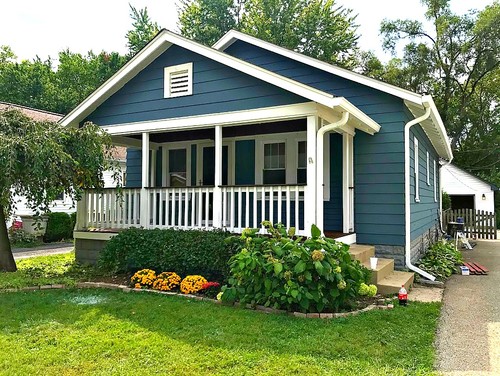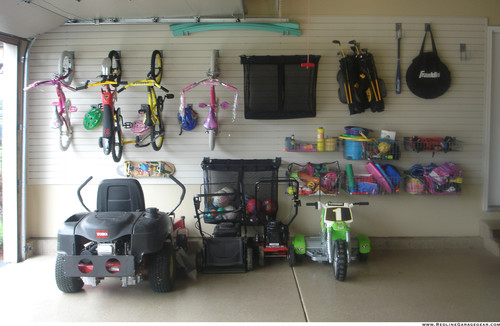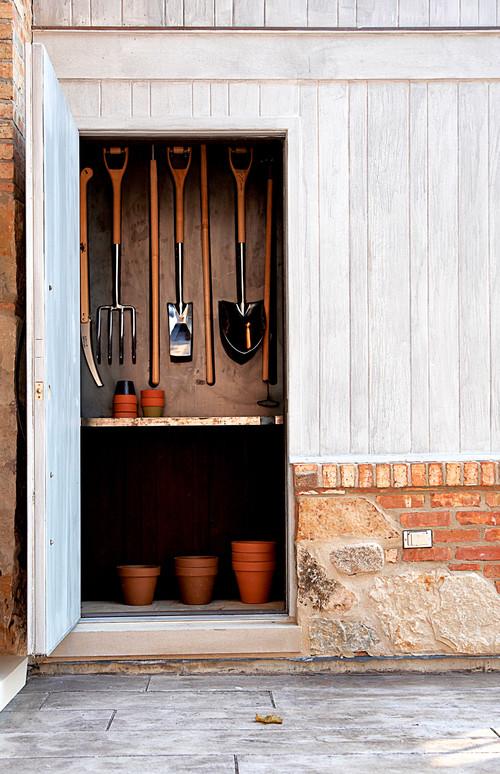How Long Does Paint Last? The Expiration Date on Your Home’s Exterior and More Outdoors
How long does paint last? This question might sneak up on you as your home’s exterior paint job starts looking a bit worse for wear. After all, it takes effort to keep a house in tiptop shape, and if something’s gotta give, whatever’s outdoors tends to go first.
And not just your house, but everything outside your home. Your lawn mower, gardening tools, and patio set take a beating all summer—and may soon be exposed to even harsher elements as the weather turns. All of this means that homeowners everywhere are advised to take stock of how their outdoor areas are faring.
To help, here are the expiration dates for six common exterior items, plus ways to extend their life spans so you can eke out a bit more time before you shell out for a replacement.
How long does an exterior paint job last?
Photo by Paintco Professional Painters
Life span: About 10 years
Rain, sleet, hail, your kids’ balls slamming against the wall, and more impact your home’s exterior paint.
“The paint’s chemical compound breaks down due to oxidation as weather, expansion, and contraction take their toll,” explains Tina Nokes, owner of Five Star Painting in Virginia’s Loudoun County.
Make it last longer: “Be sure to fix caulk around windows, door jambs, and trim to keep it sealed and moisture-free,” says Nokes. And if it truly is time to repaint, power-wash the sides first to help fresh paint adhere better, and use a primer so the new coat goes on smoothly. And consider picking a lighter color over a dark one since dark shades fade faster in the sun.
How long do outdoor power outlets last?
Photo by Linn Gresham Haute Decor
Life span: Mere weeks if the outlet isn’t up to code—or decades if made from quality materials
These little plugs need to withstand UV rays and wet conditions, reports Scott Kainz, owner of Mr. Electric in LaCrosse, WI.
Make it last longer: Unfortunately, you can’t improve shoddy outlets. Ask an electrician to assess what you have (he’ll look for weather-resistant substances and heavy-duty covers).
“High-quality covers and materials are now required for new outlets in the national electric code,” Kainz adds.
How long do lawn mowers last?
Photo by Easy Storage Products, LLC
Life span: A decade or two
“A lawn mower is a very durable product that just requires regular maintenance to work well,” explains Jordan Ribelin, a Lowe’s outdoor expert.
Make it last longer: After every mow, check for loose fasteners and then tighten them.
“Clean off dirt, clippings, and other debris from the grass catcher, and watch oil and gas levels,” adds Ribelin.
How long do garden tools last?
Life span: Five years for rakes; 20 years or more for metal tools
Garden tools should last for years, if you don’t leave them out in the rain. More delicate items such as rakes made from bamboo tend to break and wear, so they’ll need replacing sooner.
Make it last longer: Scrub tools regularly, and remove rust with steel wool. Sharpen edges with a metal file, and then apply a thin coat of lubricating oil to keep rust at bay. Hang tools on a peg board to protect new edges, rather than lean them upright.
How long does patio furniture last?
Life span: A lifetime for teak and wrought iron, 10 to 20 years for other materials
Wrought iron and teak are top of the line and should last as long as you do. Other woods, plastic, and resin can start to look shabby and grow mold much sooner. Coastal homeowners have to contend with salty air and humidity, while mountain dwellers’ furniture will become sticky with sap.
Make it last longer: Keep your outdoor set longer by investing in the right covers or storage. Zip-up cases or a dry garage or basement will protect your chairs during winter months. Deep cleaning with a pressure washer on the lowest setting is smart, too, adds Ribelin.
How long do garden hoses last?
Photo by Nicola’s Garden Art Inc.
Life span: Seven years for a rubber hose; a lifetime for the coiled ones
The biggest threat to a hose is water, mold, and mildew—as well as twists and tangles.
Make it last longer: Don’t leave your hose in a garage where it could freeze and crack in cold weather (the basement is a better bet). Invest in a hose reel to prevent tangles.
For this article and more like it, visit Realtor.com.







Leave a Reply
Want to join the discussion?Feel free to contribute!